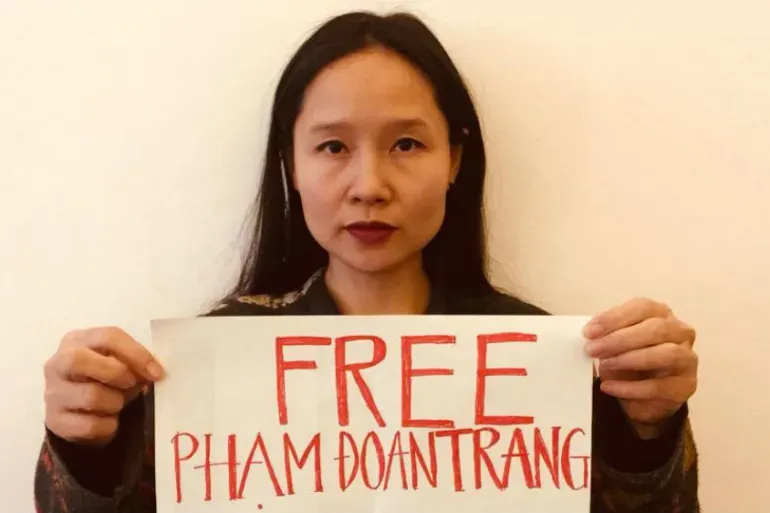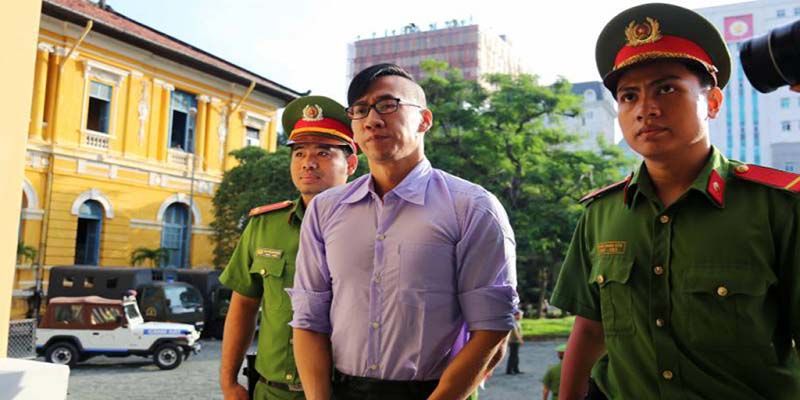The Cybersecurity Law will take effect on January 1, 2019. Blogger Pham Doan Trang, one of Vietnam’s prolific writers and a known government critic, shares her experiences on repression and authority harassment. With the new law, activists like Doan Trang fear the government will attempt to silence the voices of the people who are using Facebook as their platform to voice their opinions.
Reporters Without Borders’ 2018 World Press Freedom Index ranks Vietnam 175 out of 180 countries – one point ahead of China.
Title: Digital dictatorship in Vietnam seeks to silence dissidents
Publish Date: November 15, 2018
Publisher: Al Jazeera
Excerpt:
Activists fear new cyber law will allow authorities to crack down harshly on those promoting freedom of expression.
Ho Chi Minh City, Vietnam – Pham Doan Trang strums softly on an acoustic guitar. She’s performing the Vietnamese folk song Water Ferns Drift Clouds Float Far. It’s a song permitted by Vietnam’s government. The authorities keep a close eye on any public performance.
Trang, 39, now suffers when she plays the song. Not because of its moving lyrics or melody but because she can barely strum the chords. Last August, Trang was arrested along with 50 others at a concert in a Ho Chi Minh City teashop.
“They raided the concert. They said the singer was singing unpermitted songs,” Trang said.
“They have a law that stipulates that every songwriter must register to perform and disseminate a song. That means if you compose a song and perform it somewhere without asking for permission, you are doing something illegal.”
Witnesses watched as police physically assaulted Trang who was seated in the audience. While in police custody, she sustained injuries to both hands. Many weeks later, bruises still cover her knuckles.
She was never charged with a crime but had her passport, phone and laptop confiscated.
It was not the first time Trang was arrested or assaulted. In 2015, she was participating in a protest against the felling of trees in the capital, Hanoi. Police descended on protesters and both her knees were broken.
This has left her with a debilitating limp.
“Since I became an activist, I [have been] attacked, physically attacked, many times by the police. Now I am disabled,” Trang said, looking down at her hands, knees and mobility aid by her side.
“Once you learn about freedom, it’s very hard for you to stop.”
Communist mindset
Trang is one of Vietnam’s most prolific dissident writers. Her most recent book Politics for the Masses got her briefly detained earlier this year. It’s a political primer for pro-democracy activists.
“Many people say this book can give me a prison sentence of 20 years. This book may give me a death sentence. It’s a logical deduction,” Trang said. “I don’t know what is their strategy or plan. I mean [a] status on Facebook may attract several likes, not hundreds or thousands, but people are still given 20 years [in prison]. I can’t understand the mindset of communists.”
Facebook overthrow?
From Facebook down to the Streets is a 2016 samizdat book by Pham Doan Trang. It raised the attention of Vietnamese authorities as it documented the country’s nascent environmental movement.
Trang is extremely careful with her online activity. She knows any comment she posts to Facebook could be used to prosecute her and send her to prison like many of her peers.
Vietnam’s government has stated it employs a 10,000-strong cyber “task force” to monitor activists.
“What are they thinking? Do they actually think that people writing on Facebook can overthrow the administration?” Trang asked.
Since last June, nationwide protests against Vietnam’s proposed Special Economic Zones and cybersecurity law have caught Hanoi off guard. Hundreds were arrested.
“Vietnamese Facebook users are close to 60 million,” said Vi Tran, co-director of Legal Initiatives for Vietnam. “Many large protests [against the government] around the country have started on Facebook.”
Inside Vietnam, historically information flowed from the top down via state-run media, but with the rise of blogging and social media platforms now the news flows horizontally with bloggers and journalists writing and sharing news independently.
Reporters Without Borders’ 2018 World Press Freedom Index ranks Vietnam 175 out of 180 countries – one point ahead of China. Freedom House says Vietnam is not free.
A song for freedom
The law will come into effect on January 1, 2019. Tech giants Facebook and Google have been given one year from this date to comply. Human Rights Watch has called it disastrous for freedom of expression in Vietnam.
Vietnamese civil society groups are concerned Facebook has begun to block or shut down accounts requested by the authorities. This move could silence many dissidents currently using the platform to share independent news and opinions.
“I just feel worried for other people. I’m so familiar with violent suppression and political repression,” Trang said. “But for other people, it’s a real danger because now they can be arrested and given lengthy prison terms for a post.”
Trang is extremely worried about the deteriorating human rights situation in Vietnam. But she’s optimistic about the peaceful, non-violent, methods used by her compatriots to express their dissatisfaction with the regime in Hanoi.
Download:




